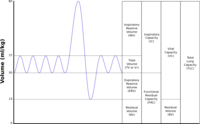
Photo from wikipedia
Background Myasthenia gravis (MG) is an immune-mediated disorder characterized by muscle fatigue and fluctuating weakness. Impairment in respiratory strength and endurance has been described in patients with generalized MG. We… Click to show full abstract
Background Myasthenia gravis (MG) is an immune-mediated disorder characterized by muscle fatigue and fluctuating weakness. Impairment in respiratory strength and endurance has been described in patients with generalized MG. We tested the hypothesis that respiratory muscle training (RMT) can improve functional outcomes and reduce fatigue in patients with MG. Methods Eighteen patients with mild to moderate MG participated in this study. The training group underwent home-based RMT three times a week for 12 weeks. Sixteen patients with MG without RMT were enrolled as a disease control group. Lung function, autonomic testing, Multidimensional Fatigue Symptom Inventory-Short Form (MFSI-SF), and functional outcome measurement by using quantitative myasthenia gravis (QMG) score and myasthenia gravis composite (MGC) scale were measured before and after the 12-week RMT. Results The 12-week RMT significantly increased forced vital capacity (FVC) from 77.9 ± 12.6% to 83.8 ± 17.7% (p = 0.03), forced expiratory volume in one second (FEV1) from 75.2 ± 18.3% to 83.3 ± 19.0% (p = 0.03), forced expiratory volume in one second (FEV1) from 75.2 ± 18.3% to 83.3 ± 19.0% (p = 0.03), forced expiratory volume in one second (FEV1) from 75.2 ± 18.3% to 83.3 ± 19.0% (p = 0.03), forced expiratory volume in one second (FEV1) from 75.2 ± 18.3% to 83.3 ± 19.0% (p = 0.03), forced expiratory volume in one second (FEV1) from 75.2 ± 18.3% to 83.3 ± 19.0% (p = 0.03), forced expiratory volume in one second (FEV1) from 75.2 ± 18.3% to 83.3 ± 19.0% ( Conclusion The home-based RMT is an effective pulmonary function training for MG patients. The RMT can not only improve short-term outcomes but also reduce fatigue in patients with mild to moderate generalized MG.
Journal Title: BioMed Research International
Year Published: 2020
Link to full text (if available)
Share on Social Media: Sign Up to like & get
recommendations!